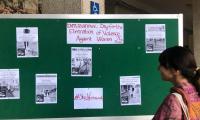“Hopefully my efforts will enhance the rights of women with disabilities”

In Jordan, just like in most parts of the Middle East and North Africa, women with disabilities experience gender discrimination as well as barriers to participation, resulting in a double discrimination that can extend to all areas of life. Furthermore, they are often left in a dark spot when it comes to laws and policies that concern their rights as women and as persons with disabilities.
This was part of Nouha’s conclusion in her master’s thesis which was completed this year as part of the Arab Master’s in Democratization and Human Rights. The first semester of the master’s program took place at the Saint Joseph University in Lebanon’s capital Beirut, while in the second semester, Nouha was able to get an internship at the Center for Strategic Studies (CSS) of the University of Jordan in Amman. Her studies have now paved the way for an employment as a research assistant at the CSS, ranked as a top think tank in the MENA region by the Think Tank and Civil Societies Programme.
Master’s degree in human rights leads to employment
Nouha is one of a growing number of young people from the Arab world who are eager to learn more and promote human rights in the region and abroad. So far, 112 students have finalised the Arab Master’s in Democratization and Human Rights which was established by the Danish Institute for Human Rights and a number of universities in 2015. Today, the majority of the students who have graduated are in one way or another promoting human rights as part of their jobs at either universities, in civil society organisations or ministries around the region. A study from 2019 shows that 80 percent of them have been employed afterwards.
The master’s has enriched Nouha’s legal knowledge on human rights and strengthened her understanding of the international human rights system and conventions and their impacts on national laws and policies in the MENA region.
“In general the studies enhanced my understanding of the human rights situation and how laws and policies are being shaped and monitored in different countries of the MENA region. Studying in Lebanon broadened my network and finally led me to a job in Jordan,” Nouha says.
She previously worked for various international organisations, including the NGO Humanity & Inclusion (Handicap International) working on disability issues in Morocco, Algeria and Tunisia.
The studies also introduced her to research ethics and its rigorous methodology, which allowed her to publish her first academic article with other classmates on human rights recent development in the MENA region. This experience also strengthened her skills and competencies enabling her to conduct her thesis research on women with disabilities at the Centre for Strategic Studies in Jordan. She is now convinced that her enhanced understanding of human rights law and research methodology has strengthened her ability to advocate for the rights of women with disabilities and other vulnerable groups.
“I always try to bring in the case of women with disability”
As a research assistant and project coordinator at the Centre for Strategic Studies, she is currently assisting her colleagues who are working on the Jordanian part of the largest multi-country study on men and equality in the Middle East and North Africa, coordinated by UN Women. Though women with disabilities are not the main focus of this research project, they are always on Nouha’s mind and she hopes to include them in one way or another.
“Whenever there is a discussion on women and vulnerability, I try to bring in the case of women with disabilities, because I know how often they get excluded. Since we are working on developing a survey that will target both men and women in Jordan, whenever I get the opportunity, I suggest to add questions that could shed the light on some of the most vulnerable and left out populations such as women with disability. Hopefully my efforts will contribute to enhancing the rights of women with disabilities in Jordan and elsewhere,” she says.
- So far, 112 students from 27 different countries have finalised the Arab Master in Human Rights and Democratization.
- The Master's programme will become a two-years Master´s programme.
- The Saint Joseph University in Lebanon hosts the Arab Master. The programme also involves the International University of Rabat in Morocco, Birzeit University in Palestine, University of Carthage in Tunisia, the European Inter-University Centre (EIUC) and a growing network of universities.
- The scholarships for the Arab Master in Human Rights and Democratization is financed by the Danish Arab Partnership Programme (DAPP), and the Master is financed by DAPP among others.
